Research & reports

Did you want to read our research and reports?
We are experts in carrying out research and have collated these reports for you to download completely FREE!
All resources are copyright ©VictimFocus, please do not copy or redistribute them anywhere. All downloads are licensed for personal use only.
Approaches to VAWG
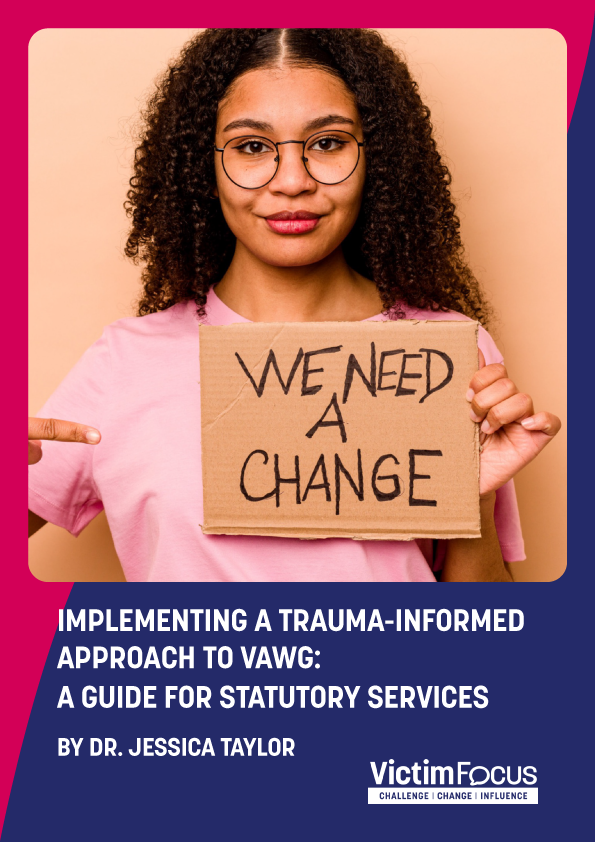
-
Implementing a Trauma-Informed Approach to VAWG: A guide for statutory services
Implementing a Trauma-Informed Approach to VAWG: A guide for statutory services
Dr. Jessica Taylor
The FREE guide contains handy checklists to guide you through reflective approaches to implementing trauma informed practice.
Whilst trauma-informed approaches have been talked and written about for many years, these approaches have become more mainstream in the last few years. Unfortunately, as they become more mainstream, they are in danger of being misused and misunderstood if not carefully explained, and then implemented. ‘Trauma-informed’ has recently become something of a buzzword in public services and academia, without much underpinning knowledge of its theoretical and practical origins and implications.
This guide will provide a detailed understanding of trauma-informed approaches to VAWG, to support with service design, delivery, scrutiny, commissioning, and communications.
Who can use this guide?
Anyone can use this guide, but it is aimed at service leaders, directors, commissioners, and decision makers in the following UK services:
• Police forces
• Police and Crime Commissioners
• Crown Prosecution Service
• Children’s social care and safeguarding services (CSA, CSE, CCE, MASH, MARAC, SG)
• Adult’s social care and safeguarding services (DA, SV, MASH, MARAC, SG)
• Health services and partner agencies
• Charities and voluntary services working with women and girls (and families)
• Local authority and CCG commissioners
• Funding decision makers/commissioners
Click below to download the pdf guide
'I needed to know that I wasn't crazy'
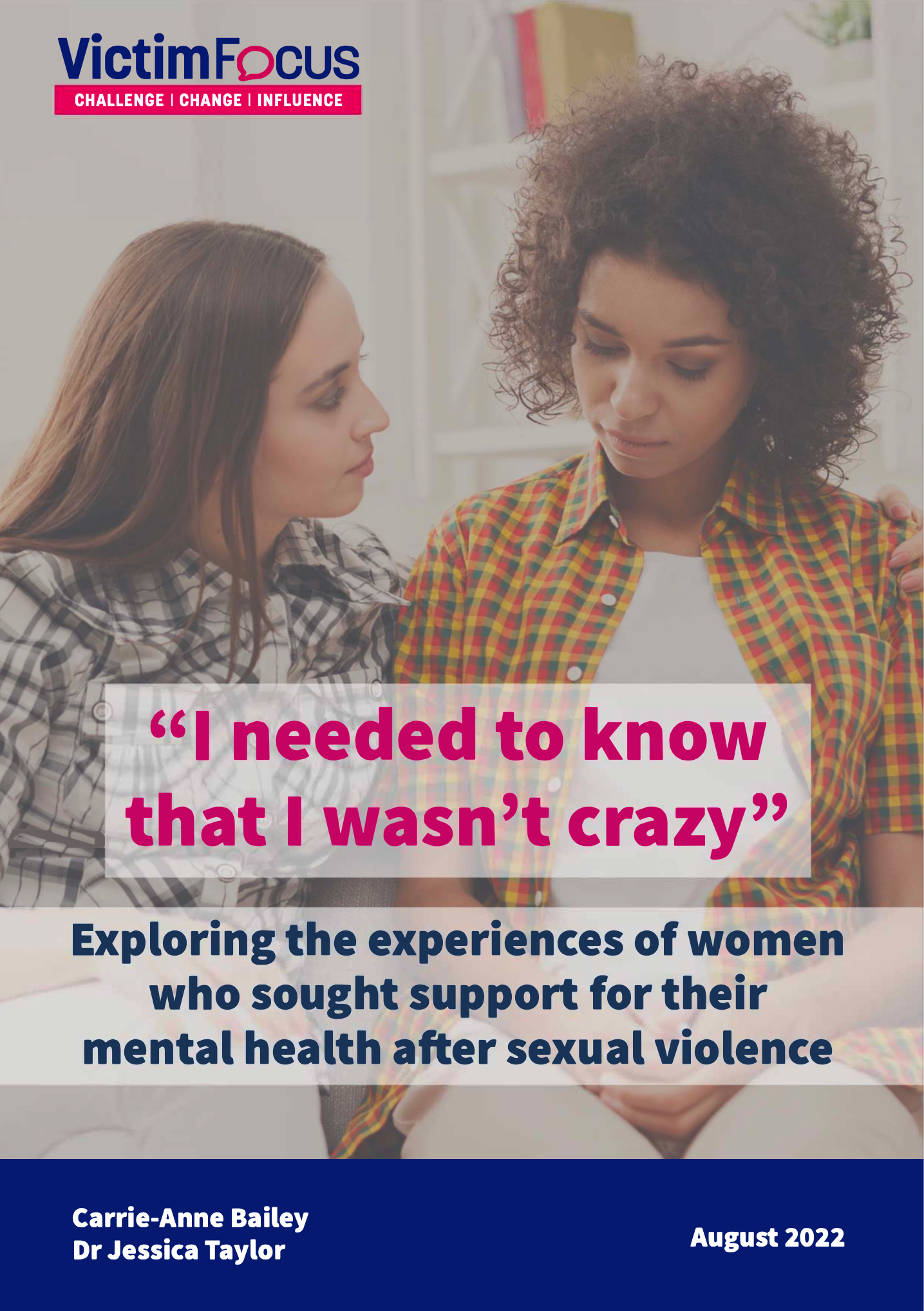
-
Exploring the experiences of women who sought support for their mental health after sexual violence
By Carrie-Anne Bailey and Dr Jessica Taylor
August 2022
We are pleased to present this in-depth report which seeks to present the multi-faceted and often complex experiences 395 women had when seeking support for their mental health following sexual violence committed against them.
Our research found that women had many different triggers to seeking support for their mental health, but that their experiences of doing so ranged from excellent, to incredibly harmful.
Psychiatric diagnosis after disclosing sexual violence was common – and even when women directly stated that they did not feel they were mentally ill, but did feel that they were traumatised by the sexual violence they were subjected to, they were still likely to be diagnosed with depressive disorders, anxiety disorders, and personality disorders.
Despite this, there is clearly a complex and nuanced relationship with diagnosis after sexual violence, as some women in the study felt that their diagnosis validated them and made them feel more in control. However, many women spoke openly about accepting diagnoses and medication they did not agree with in order to get the help they really wanted: therapy.
This report finds that women seeking help for their mental health following sexual violence were presented with numerous barriers, stigma, assumptions, stereotypes and an increasingly underfunded and over-medicalised view of their trauma.
Click below to download the report
Hallucinations
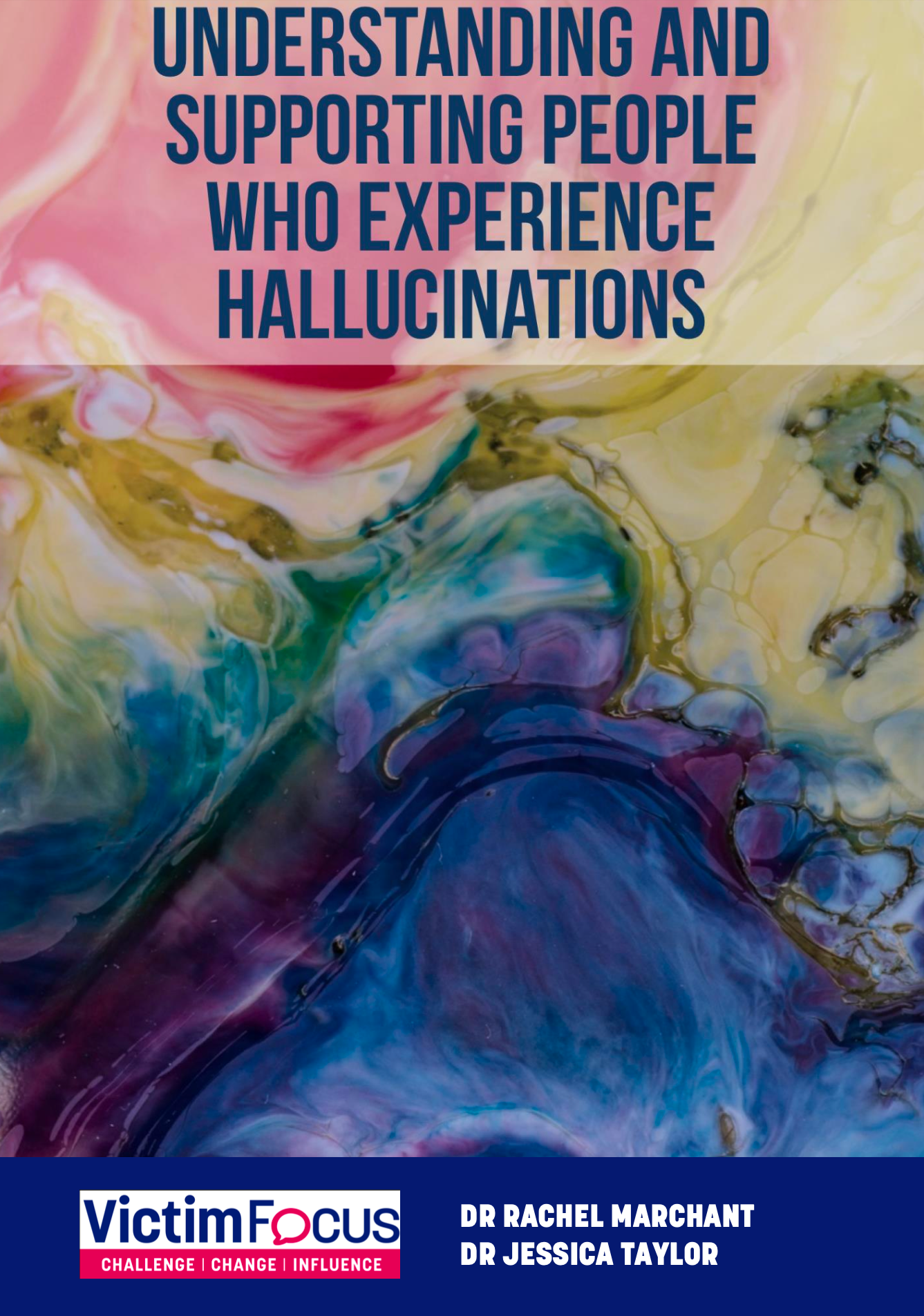
-
Understanding and Supporting People who Experience Hallucinations
Written by Neuropsychologist Dr Rachel Marchant, Illustrated by Alex Craig and edited by Psychologist, Dr Jessica Taylor
October 2021
In the 82-page, free handbook, neuroscientist Dr Rachel Marchant explains what she has learned about hallucinations in people who are considered to have ‘disorders’, and those without. Interestingly, she argues that hallucinations are common, normal, and some studies have found that they occur more frequently in the general public than they do in people who are diagnosed with psychiatric disorders.
This new resource contains key research, explanations, theories, evidence and advice for working with clients aged 16+ who report any kind of hallucinations, experiences or feelings that they want to explore further, including visual, auditory, olfactory and sensory hallucinations. It will help you explore:
What do the hallucinations feel like?
What emotions come with them?
What emotions are felt before they begin and after they end?
What message or purpose does the hallucination have?
This report and related recommendations should be considered vital to any organisation seeking to engage victims, survivors and people with experience of all different types of abuse, oppression, health and illness, loss, distress, and trauma.
We consider that children and adults experiencing hallucinations should be supported in trauma-informed approaches that seek to help the person explore, understand and learn about their hallucinations, and what could be causing them to happen. We have ealso developed a set of interactive flashcards to be used alongside this report.
Click below to download the report
Survivor speakers
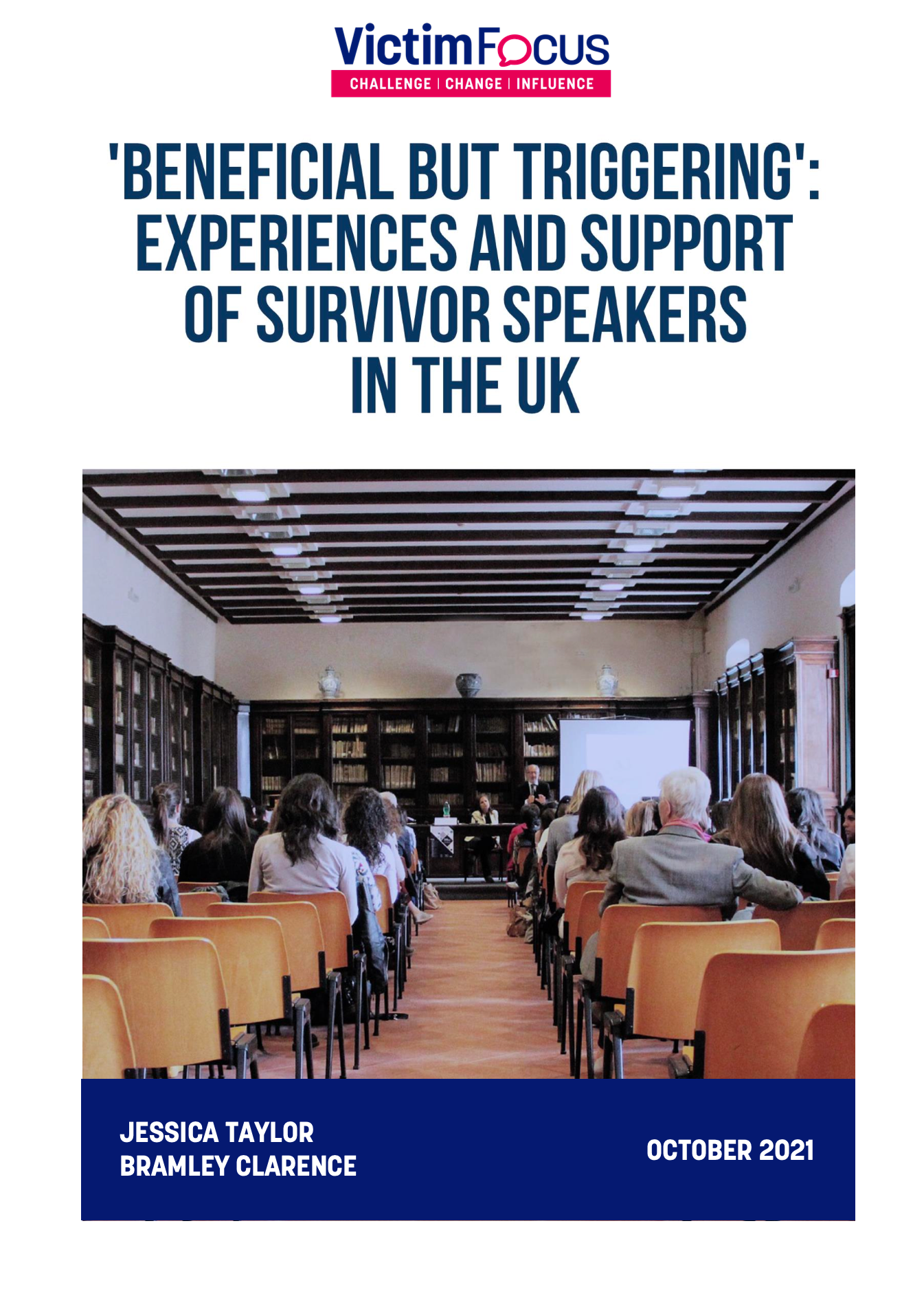
-
Implementing a Trauma-Informed Approach to VAWG: A guide for statutory services
By Dr Jessica Taylor and Bramley Clarence
October 2021
This report and related recommendations should be considered vital to any organisation seeking to engage victims, survivors and people with experience of all different types of abuse, oppression, health and illness, loss, distress, and trauma.
With many organisations now moving towards, or aspiring to trauma informed approaches and philosophies, now is the time to explore whether asking children and adults to retell their traumas repeatedly, is still needed or indeed, whether it was ever ethical at all.
We are grateful to the 58 survivor speakers from across the UK who took part anonymously. Their experiences show that despite many of them retelling their traumas more than 25 times each, only 9% of them had ever been paid, or had their expenses reimbursed.
Further to the financial exploitation of these roles, only 7% of survivor speakers in our study said that they had ever been offered psychological support, counselling, debriefing or emotional support after retelling their experiences
These findings are somewhat concerning given that most survivor speakers are approached by the charities, services or authorities that helped them, and report feeling obliged to give back by becoming a speaker.
In their experiences of public speaking, over two thirds of the survivor speakers said that they had been subjected to offensive, inappropriate, or hurtful comments and questions from the audience. Around half of them said that retelling their experiences had impacted them negatively and had led to them blaming themselves for being abused, feeling belittled, commodified and triggered.
Click below to download the report
Buy a printed copy of the report (£4)
'I thought it was just a part of life'
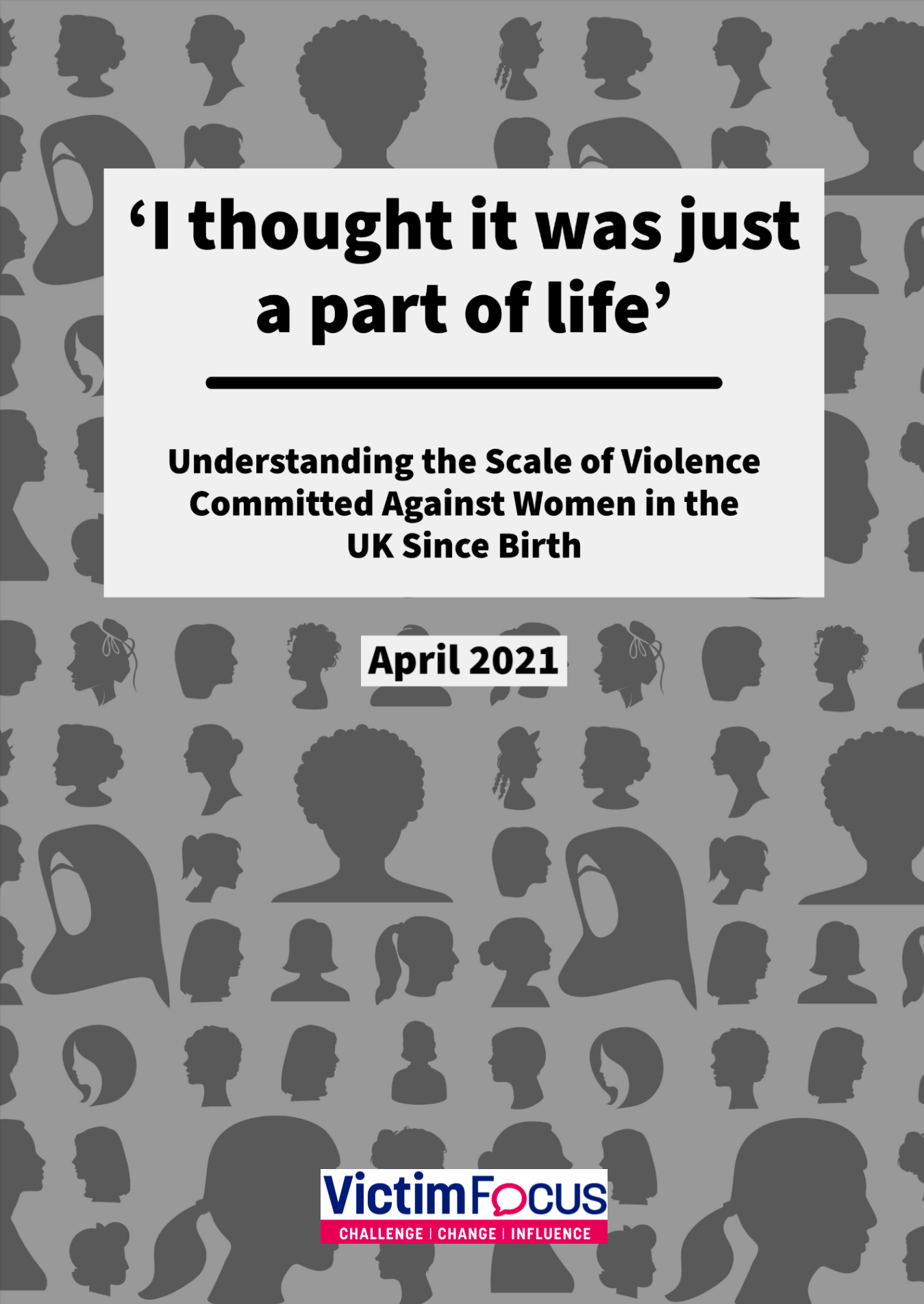
-
Understanding the Scale of Violence Committed Against Women and Girls in the UK since Birth.
by Dr Jessica Taylor and Jaimi Shrive
April 2021
Over 22,000 UK women told VictimFocus about their experiences of violence and abuse.
This dataset is the largest and most comprehensive record of violence committed against women and girls in the UK.
99.7% of our sample had been repeatedly subjected to violence including assaults, harassment and rape.
Only 0.3% of women had only been subjected to one violent incident or less.
Our initial findings in this report suggest that current statistics of the prevalence of violence against women have been underestimated for decades, and instead, it is likely that every woman and girl will be subjected to violence, abuse, rape or harassment.
In the vast majority of cases reported here, women were subjected to multiple crimes and the perpetrators were overwhelmingly male
Click below to download the report
Buy a printed copy (£3)
Child sexual exploitation practice
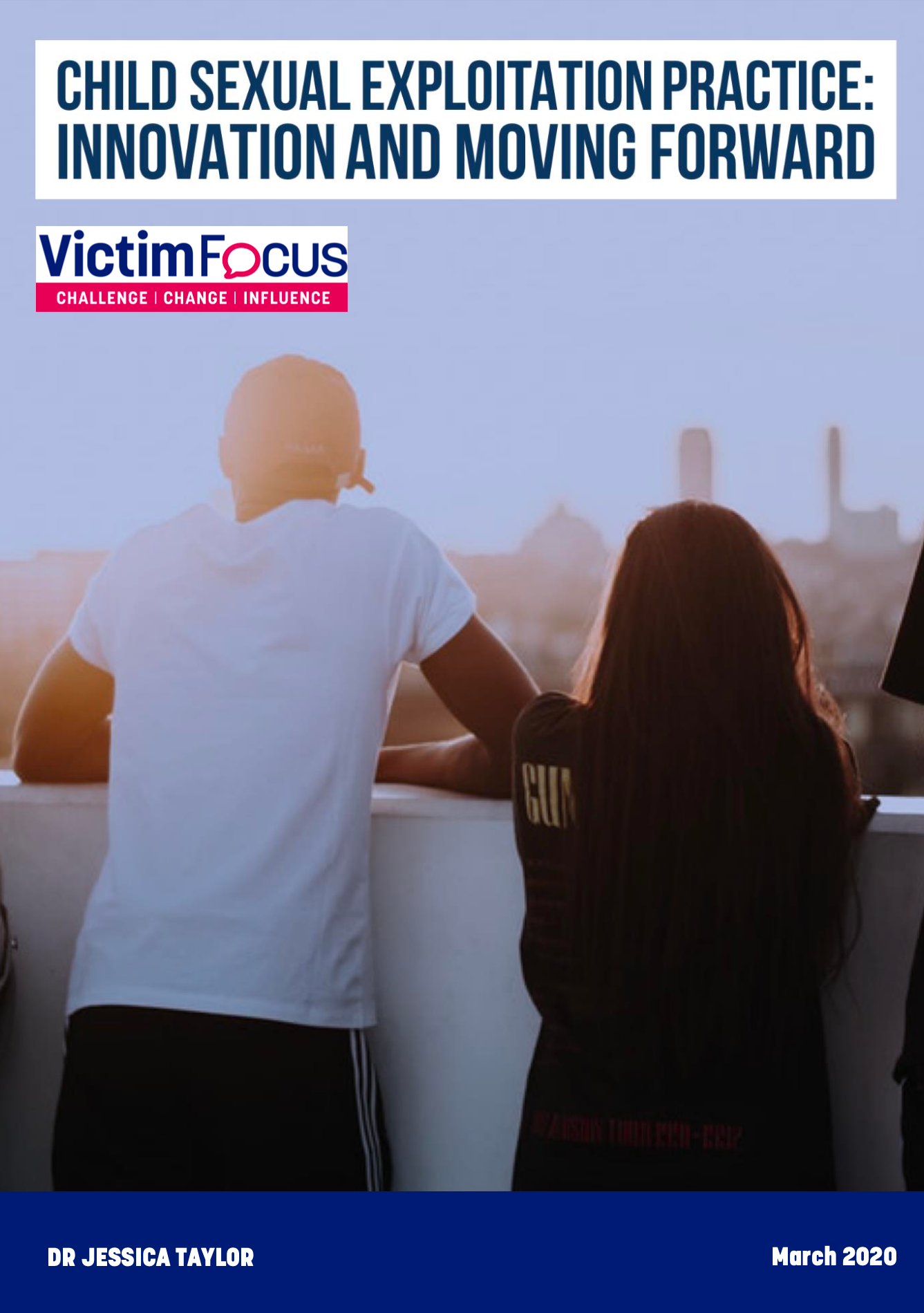
-
Child sexual exploitation practice: Innovation and moving forward
by Dr Jessica Taylor
March 2020
Third part of this three part study.
This report contains the real stories of women who have become pregnant or had children who were conceived in sexual violence committed against them by men.
These are unedited and presented without analysis to honour the real experiences and voices of women.
The intended audience for this resource includes:
Professionals, practitioners and volunteers working with women and children
Academics and students exploring topics of social work, sexual abuse, CSE, CSA, rape and trafficking of women and children
Policymakers, lawmakers and those working with women and children
Anyone with an interest in this topic including women who have been subjected to sexual violence, adults who were conceived in rape, members of the public, survivors and victims of sexual violence
Rather than learning from decades of child sexual abuse practice and evidence from related fields such as domestic abuse, there were calls for new research, new strategies, new policies, new toolkits and new definitions in child sexual exploitation which further cemented the issue as ‘new’ and ‘different’.
Now, a decade after the term ‘child sexual exploitation’ came into common usage and four years after the derogatory and harmful terms ‘child prostitution’ and ‘child pornography’ were removed from law, questions are being raised about whether CSE practice can become more innovative, more child centred and less blaming of children.
This project sought to explore how that reality could be achieved by consulting with professionals working in policing, health, safeguarding, education, mental health and therapeutic practice to understand what they felt needed to change and how that could be achieved.
The intended audience for this resource includes:
- Professionals, practitioners and volunteers working with children
- Academics and students exploring topics of social work, sexual abuse, CSE, CSA, rape and trafficking of children
- Policymakers, lawmakers and those working in children's social care
- Anyone with an interest in the critical approaches to this topic including members of the public, survivors and victims of CSE, CSA and trauma
Click below to download the report
Experiences of women

-
Experiences of women who become pregnant or have babies conceived in sexual violence
by Dr Jessica Taylor and Jaimi Shrive
January 2021
First part of this three part study.
This report presents the findings of a large study which explored the attitudes of the British public towards women who become pregnant from sexual violence committed against them by men. Further, the questionnaire asked the participants for their thoughts and perceptions of children who are conceived in rape, abuse, trafficking and exploitation of women and girls by men.
Overall, this report presents the first set of findings about the way people in the British general public perceive women who become pregnant from rape, and the way they perceive children who are conceived in rape.
We present beliefs, attitudes, ideas and opinions of 315 adults, of which, 36% stated that they personally knew at least one woman or girl who became pregnant from rape. We also present new ideas for resources, services and advice for women and girls who become pregnant from sexual violence committed against them by men.
Real Stories of Women
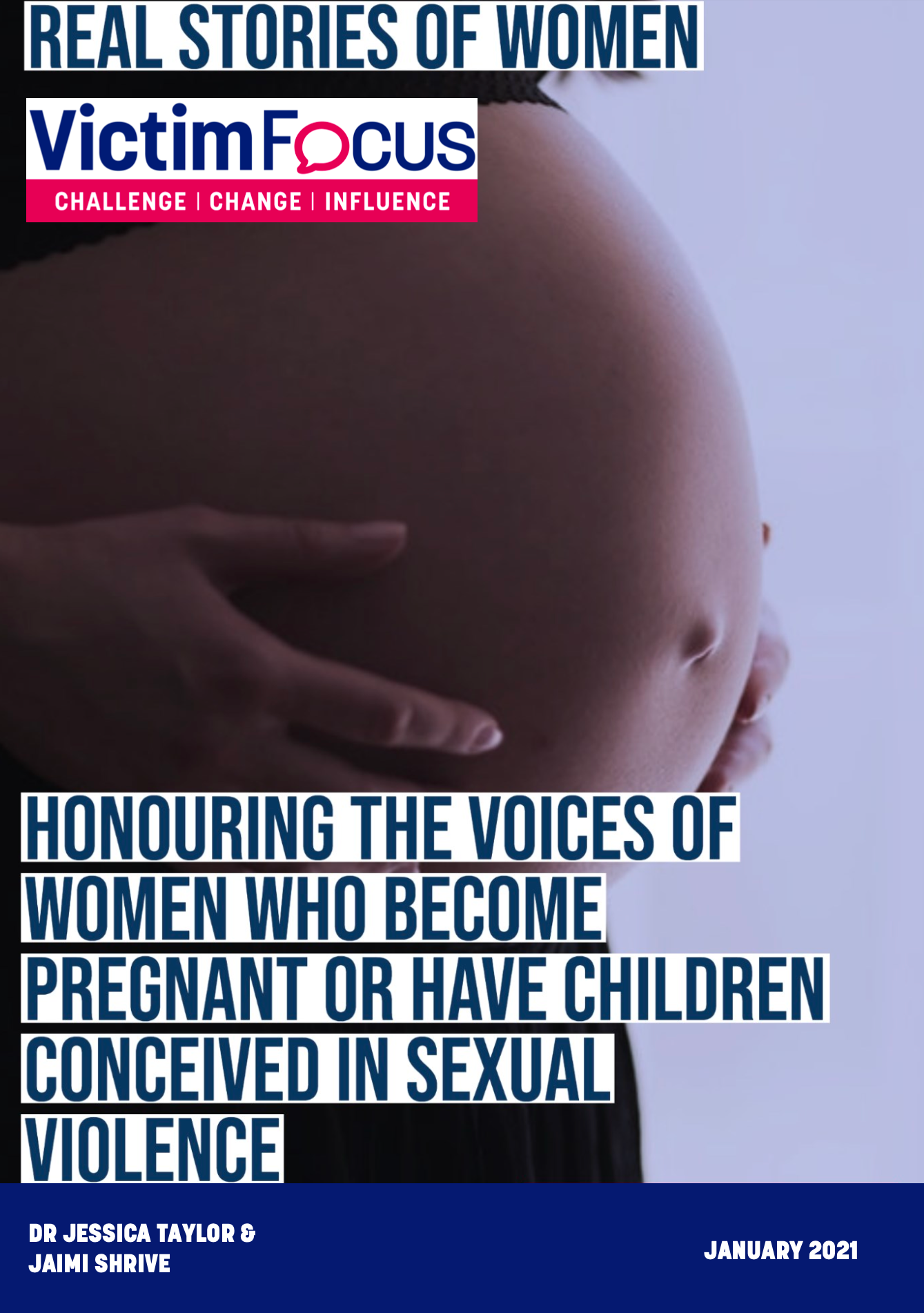
-
Honouring the voices of women who become pregnant or have children conceived in sexual violence
by Dr Jessica Taylor and Jaimi Shrive
January 2021
Second part of this three part study.
This report contains the real stories of women who have become pregnant or had children who were conceived in sexual violence committed against them by men.
These are unedited and presented without analysis to honour the real experiences and voices of women.
The intended audience for this resource includes:
- Professionals, practitioners and volunteers working with women and children
- Academics and students exploring topics of social work, sexual abuse, CSE, CSA, rape and trafficking of women and children
- Policymakers, lawmakers and those working with women and children
- Anyone with an interest in this topic including women who have been subjected to sexual violence, adults who were conceived in rape, members of the public, survivors and victims of sexual violence
Click below to download the report
Public option and perceptions
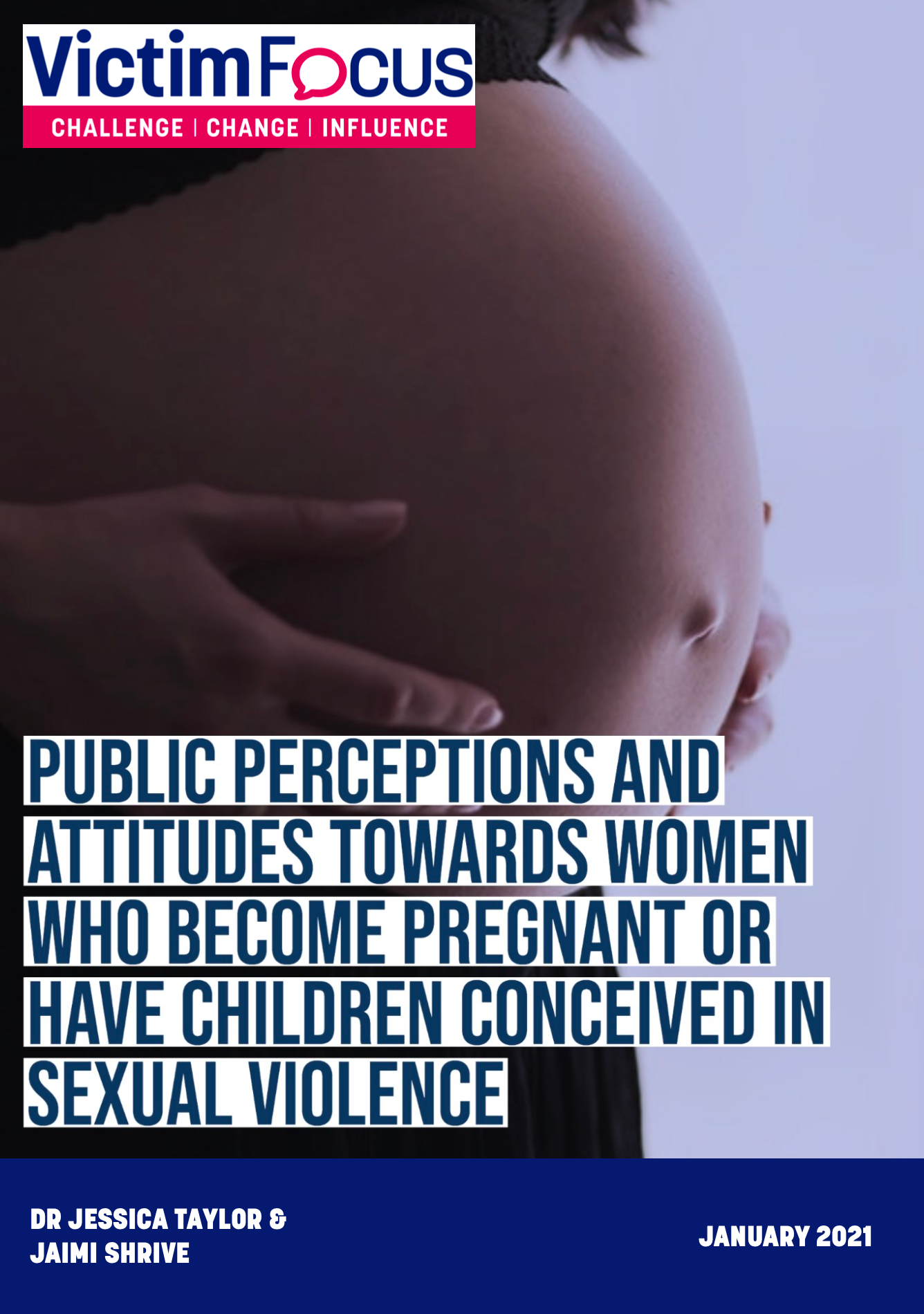
-
Public perceptions and attitudes towards women who become pregnant or have children conceived in sexual violence
by Dr Jessica Taylor and Jaimi Shrive
January 2021
Third part of this three part study.
This report presents the findings of a large study which explored the attitudes of the British public towards women who become pregnant from sexual violence committed against them by men. Further, the questionnaire asked the participants for their thoughts and perceptions of children who are conceived in rape, abuse, trafficking and exploitation of women and girls by men.
Overall, this report presents the first set of findings about the way people in the British general public perceive women who become pregnant from rape, and the way they perceive children who are conceived in rape.
We present beliefs, attitudes, ideas and opinions of 315 adults, of which, 36% stated that they personally knew at least one woman or girl who became pregnant from rape. We also present new ideas for resources, services and advice for women and girls who become pregnant from sexual violence committed against them by men.
Click below to download the report
Ethical E-Safety for children
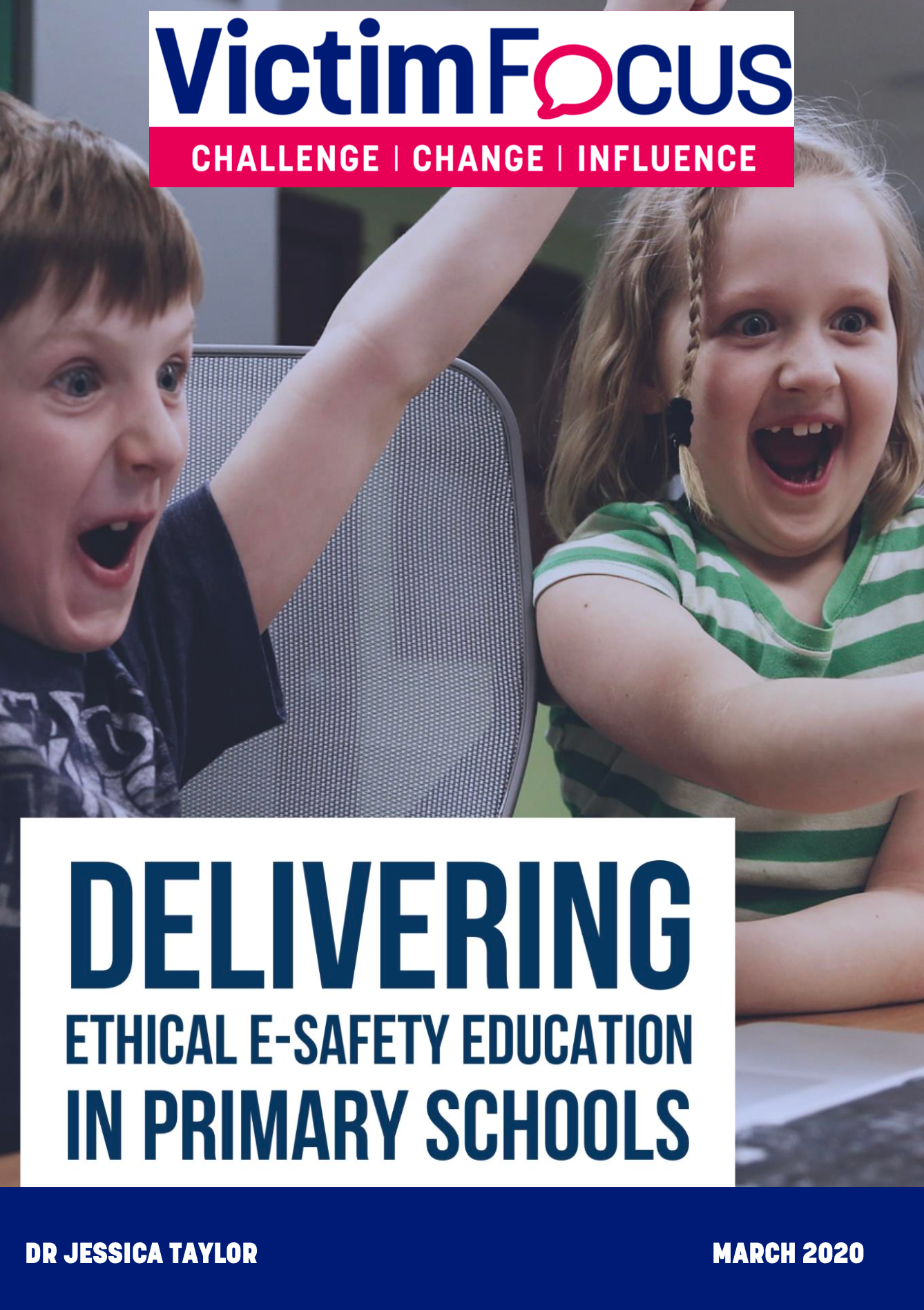
-
Delivering Ethical E-Safety Education in Primary Schools
by Dr Jessica Taylor
March 2020
Approaches to E-safety have been fairly static for several years in the UK, with common tactics centring around safeguarding, policing and restricting internet and technology access of children, without necessarily engaging with children to learn about what they are accessing, what they enjoy, what they do not enjoy and how they use technology in their daily lives.
This report describes a commissioned project in which the researcher conducted consultation about existing E-safety materials and education provision in a local authority, undertook a literature review, carried out primary research with teachers, developed new e-safety materials, piloted draft materials with over 100 primary school children, analysed and interpreted the findings before finalising a suite of evidence based, trauma-informed, anti-victim blaming modules for teachers, parents, carers and primary school children.
The report finishes with a set of recommendations to move forwards in E-safety education based on the findings from the literature and the current project.
This report may be useful for professionals working in education, safeguarding and policing who have an interest in teaching, talking to or working with children aged 4-11 years old in the topics of E-safety.
The intended audience for this resource includes:
- Professionals, practitioners and volunteers working in primary schools
- Academics and students exploring topics of education and e-safety
- Policymakers, lawmakers and those working with children
- Anyone with an interest in the critical approaches to this topic including members of the public and parents of young children
Click below to download the report
'Demonic Little Mini-skirted Machiavelli'
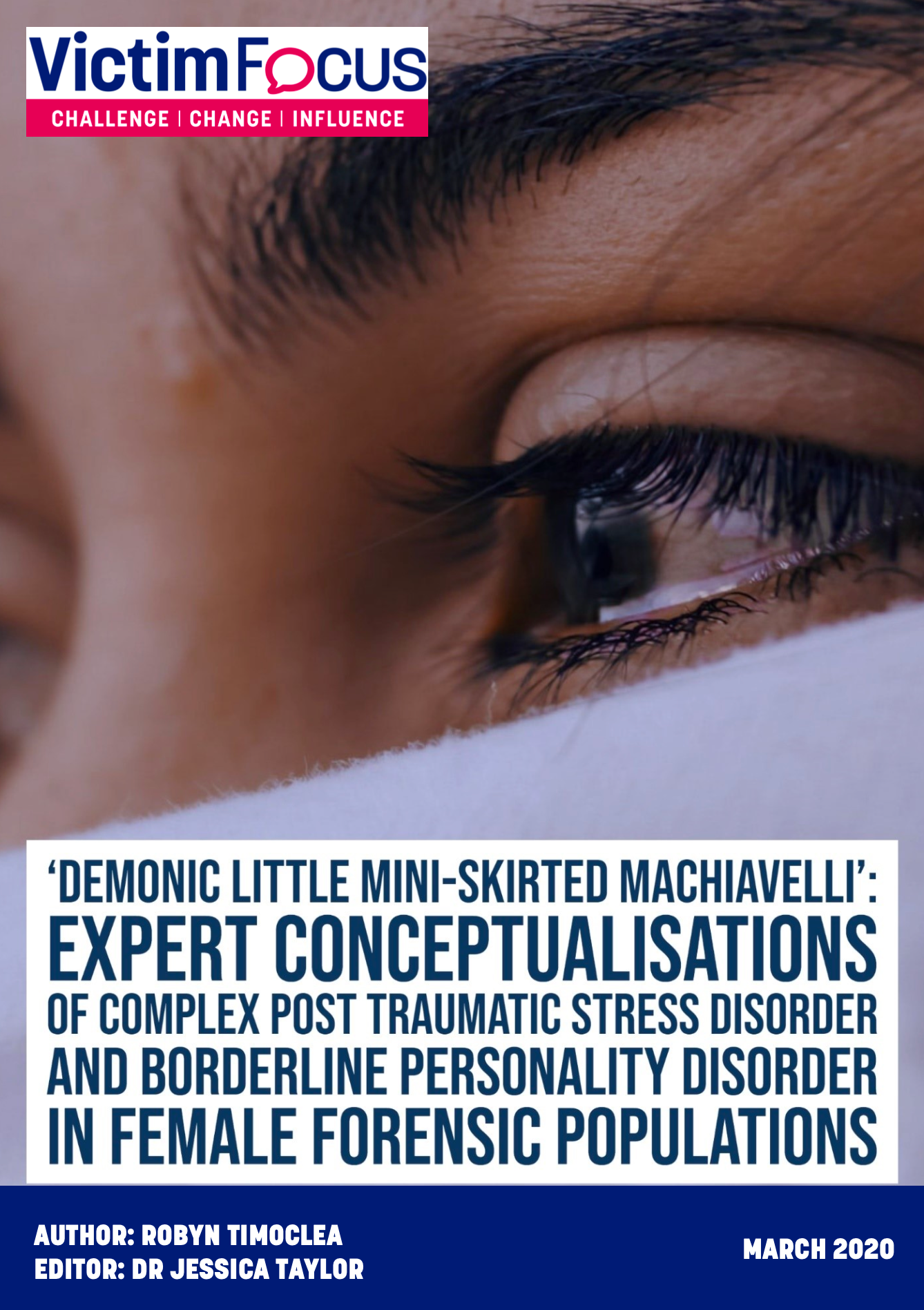
-
'Demonic Little Mini-skirted Machiavelli': Expert conceptualisations of complex post traumatic stress disorder (CPTSD) and borderline personality disorder (BPD) in female forensic populations
by Robyn Timoclea, edited by Dr Jessica Taylor
March 2020
This study considers whether the diagnosis Complex Post Traumatic Stress Disorder (C-PTSD) might replace Borderline Personality Disorder (BPD) as a less harmful alternative for women in forensic services.
This paper investigates the perspectives of key informants with a high level of expertise in the fields of complex trauma and personality disorder. Findings show contradictory perspectives and definitions for ‘personality’ and ‘trauma’.
C-PTSD was seen by some as reducing the victim-blaming phenomenon that can be generated and sustained by the application of a BPD diagnosis. Some participants raised concerns, however, that the diagnosis of C-PTSD implied a state of permanent victimhood. Furthermore, there were questions regarding women who do not identify as traumatised.
Despite these concerns, it is concluded that the iatrogenic harm associated with a BPD diagnosis warrants a more ethical replacement.
It has been written in an accessible tone but also contains academic in-text references for those who would like to explore existing literature or research discussed in this report.
The intended audience for this resource includes:
- Professionals, practitioners and volunteers working with women and girls
- Academics and students exploring topics of mental health, trauma and psychiatry with women and girls
- Policymakers, lawmakers and those working with women
- Anyone with an interest in the critical approaches to this topic including members of the public, survivors and victims of trauma
Click below to download the report
Sexual Violence in the Media
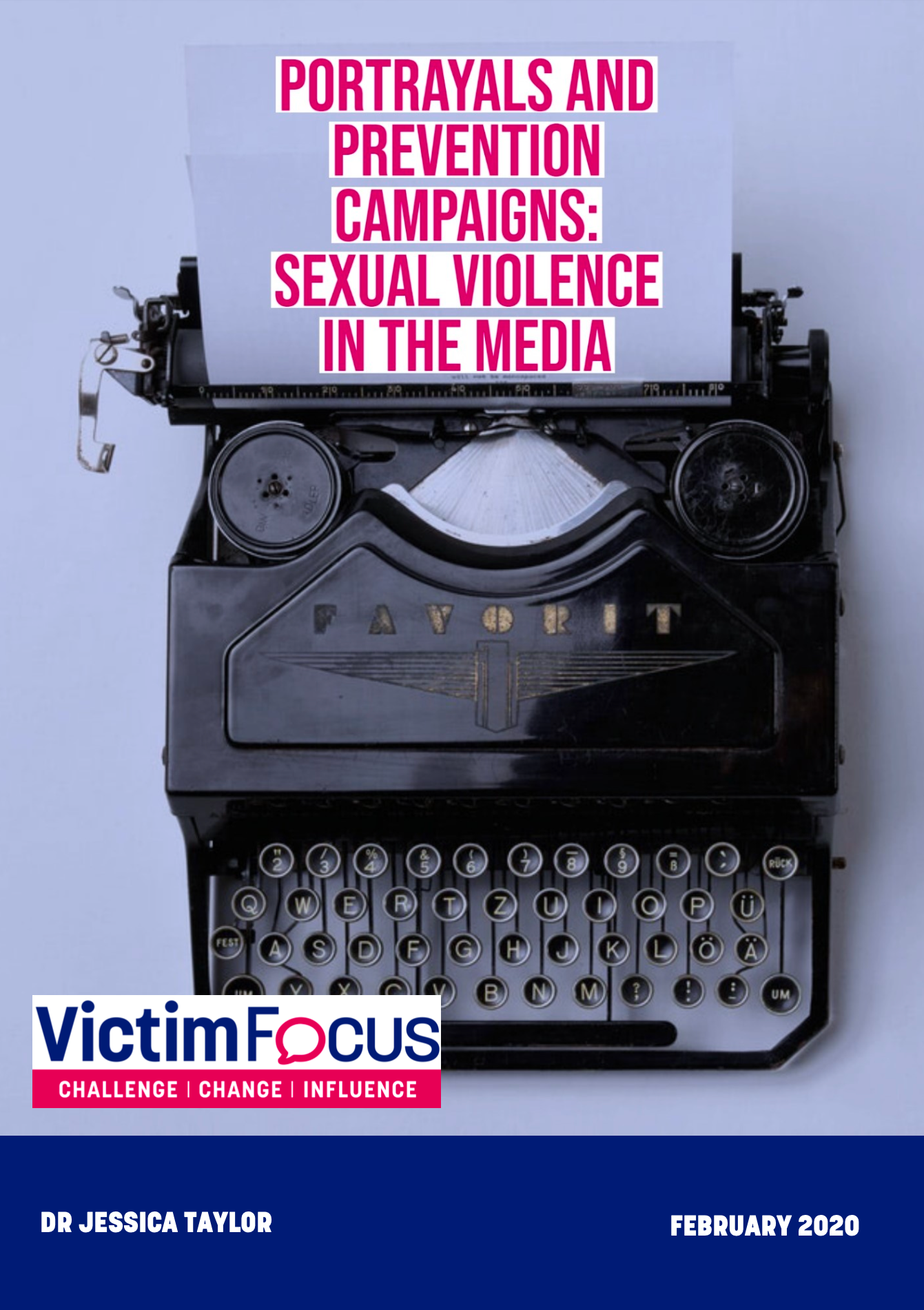
-
Portrayals and Prevention Campaigns: Sexual Violence in the Media
By Dr Jessica Taylor
February 2020
This resource contains critical discussions of the ways in which the UK and US media portray women and girls - and the sexual violence committed against them by men. Further, this report presents six examples of real sexual violence prevention campaigns by UK police and authorities that directly blame women and girls for being raped and abused.
It has been written in an accessible tone but also contains academic in-text references for those who would like to explore existing literature or research discussed in this report.
The intended audience for this resource includes;
- Professionals, practitioners and volunteers working in sexual violence and abuse
- Academics and students exploring topics of media, feminism, sexual violence and abuse
- Leadership of media teams and prevention campaigns, public safety and authorities
- Policymakers, lawmakers and those working in media, women's rights and VAWG
- Anyone with an interest in the critical approaches to this topic including members of the public, survivors and victims of sexual violence
Click below to download the report
Child Sexual Exploitation
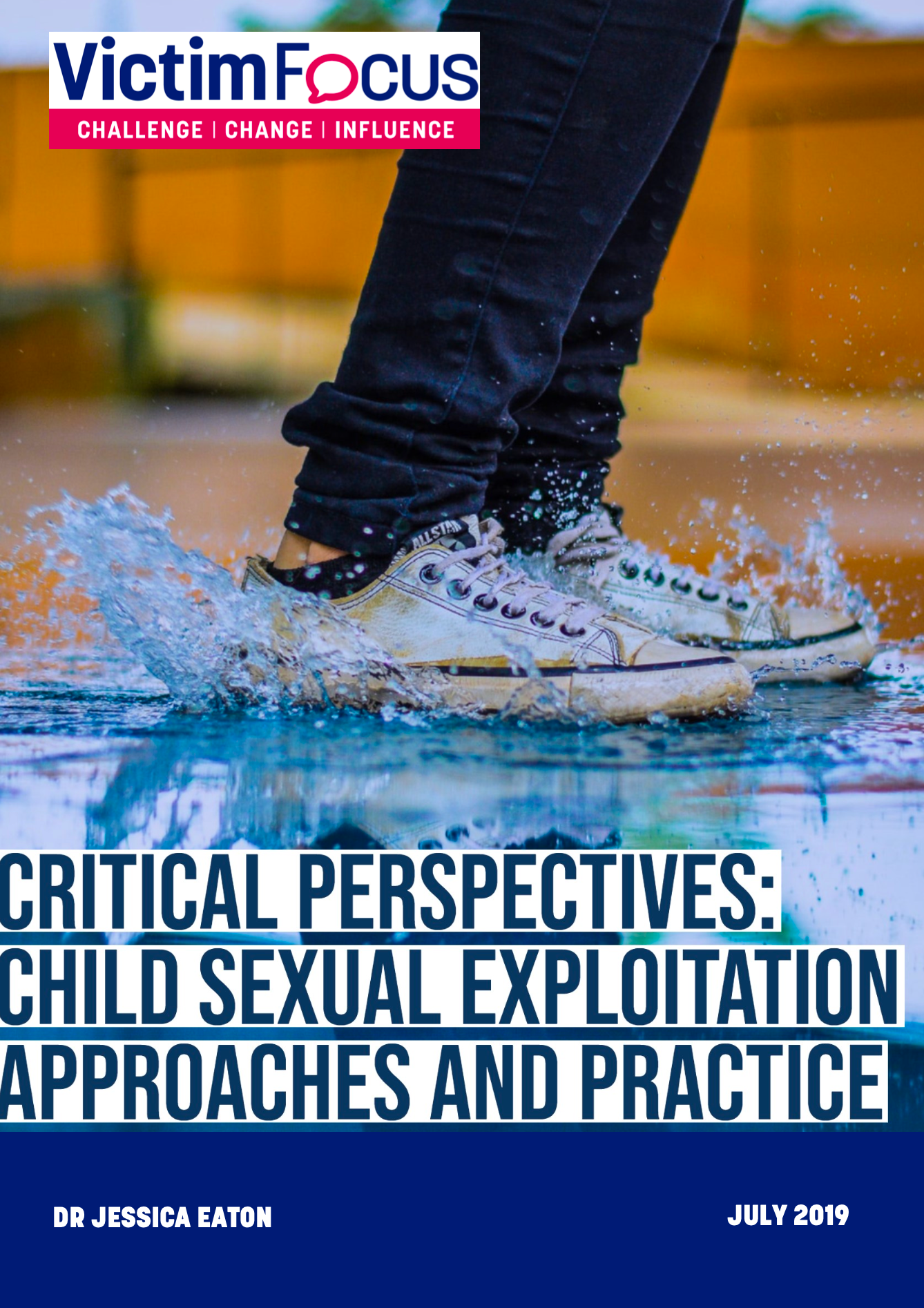
-
Critical Perspectives: Child Sexual Exploitation Approaches and Practice
By Dr Jessica Eaton
July 2019
This resource contains critical discussions of current approaches to child sexual exploitation prevention, intervention and practice in the UK.
Three core assumptions about CSE practice are critically examined:
- The assumption that only vulnerable children are sexually exploited
- The assumption that children 'take risks' that lead to CSE
- The assumption that educating children about CSE protects them from CSE
It has been written in an accessible tone but also contains academic in-text references for those who would like to explore existing literature or research discussed in this report.
The intended audience for this resource includes:
- Professionals, practitioners and volunteers working in child sexual abuse or exploitation
- Academics and students exploring topics of child sexual abuse and exploitation
- Leadership of child sexual exploitation services and teams
- Policymakers, lawmakers and those working in the rights of the child
- Anyone with an interest in the critical approaches to this topic including members of the public, survivors and victims of child sexual abuse and exploitation
Click below to download the report
'Words Do Hurt Me'
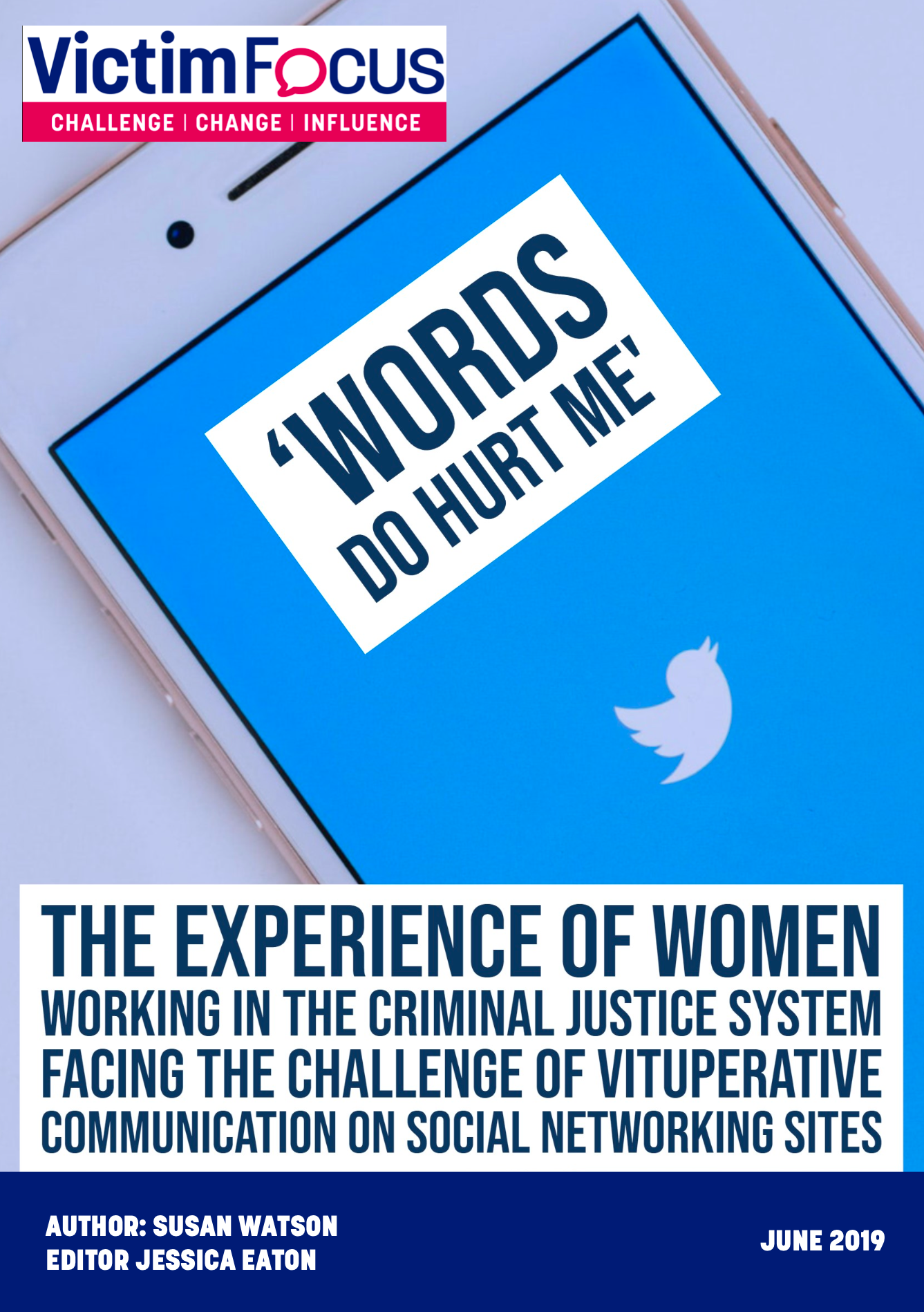
-
'Words Do Hurt Me': The Experience of Women Working in The Criminal Justice System Facing The Challenge of Vituperative Communication on Social Networking Sites
by Susan Watson, edited by Dr Jessica Eaton
June 2019
This research was undertaken as part of the MA in Social Research at the University of York by Susan Watson. The research investigates the extent to which social networking sites have perpetuated a permissive climate towards gender-based violence, and the wider impact that such online abuse may have.
Online abuse communicated via social networking sites has increased dramatically in recent years. Criminal justice agencies have been slow to respond to the immense change that has occurred as a result of the way that individuals interact in the digital space. The emerging nature of the phenomena has created a policy vacuum, with evidence suggesting that a lag in institutional responsiveness leaves victims without adequate protection or recourse.
Empirical evidence gathered from ten women in the criminal justice sector, along with obscene tweets sent to women MPs over an eleven-day period, was interrogated using thematic analysis.
Click below to download the report
Human rights of girls
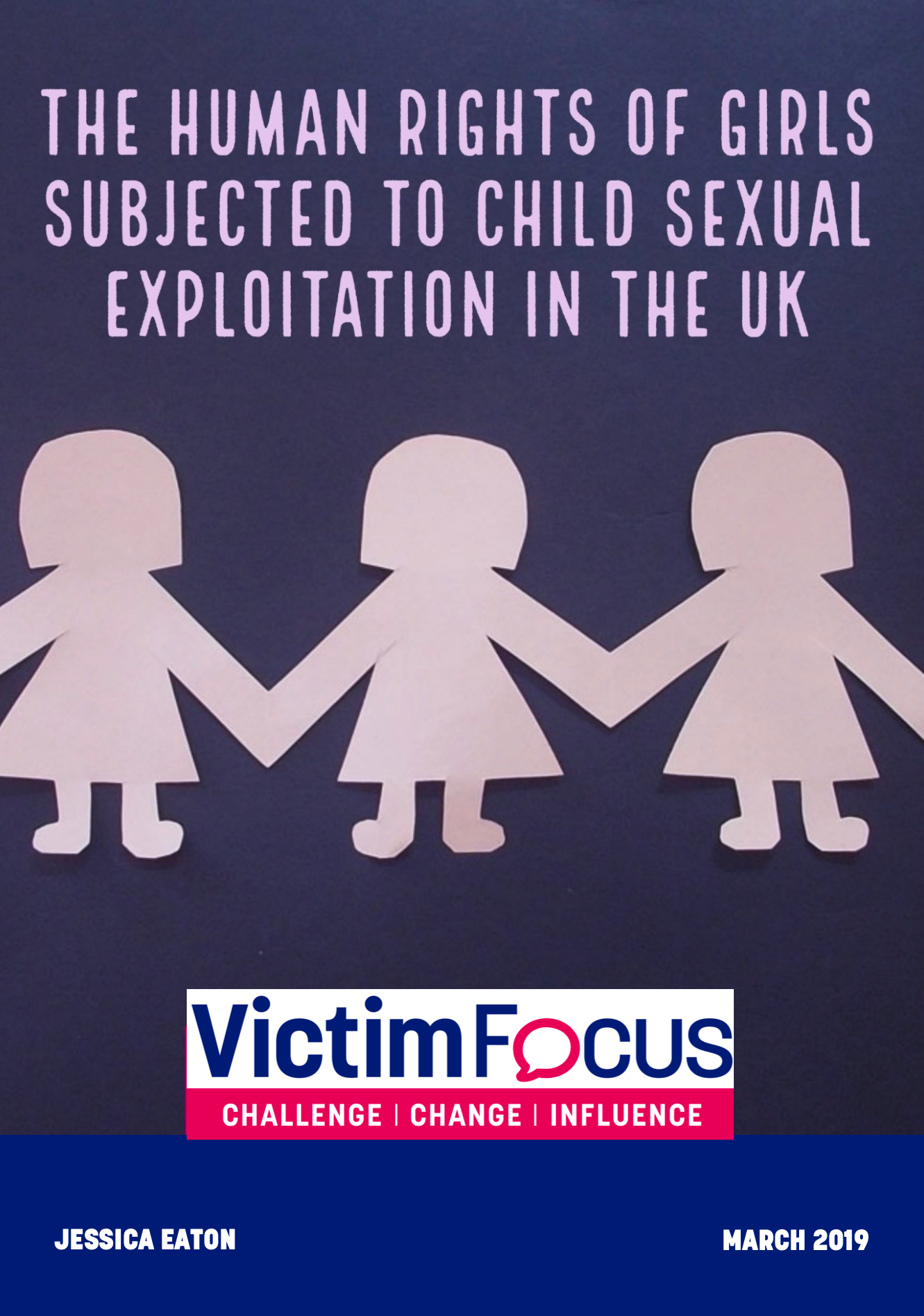
-
The Human Rights of Girls Subjected to Child Sexual Exploitation in the UK
by Jessica Eaton
March 2019
This document considers whether the human rights and entitlements afforded to girls are protecting them from sexual exploitation in the UK, and whether those rights under international and national law and legislation are being observed and adhered to when working with girls.
At the back of this document (starting at page 12) is a large table of human rights and legislative entitlements that girls who have been subjected to sexual violence should be afforded. The table explores whether the rights and entitlements are being observed and upheld in the UK using recent research and serious case reviews.
Click below to download the report
After CSE Films
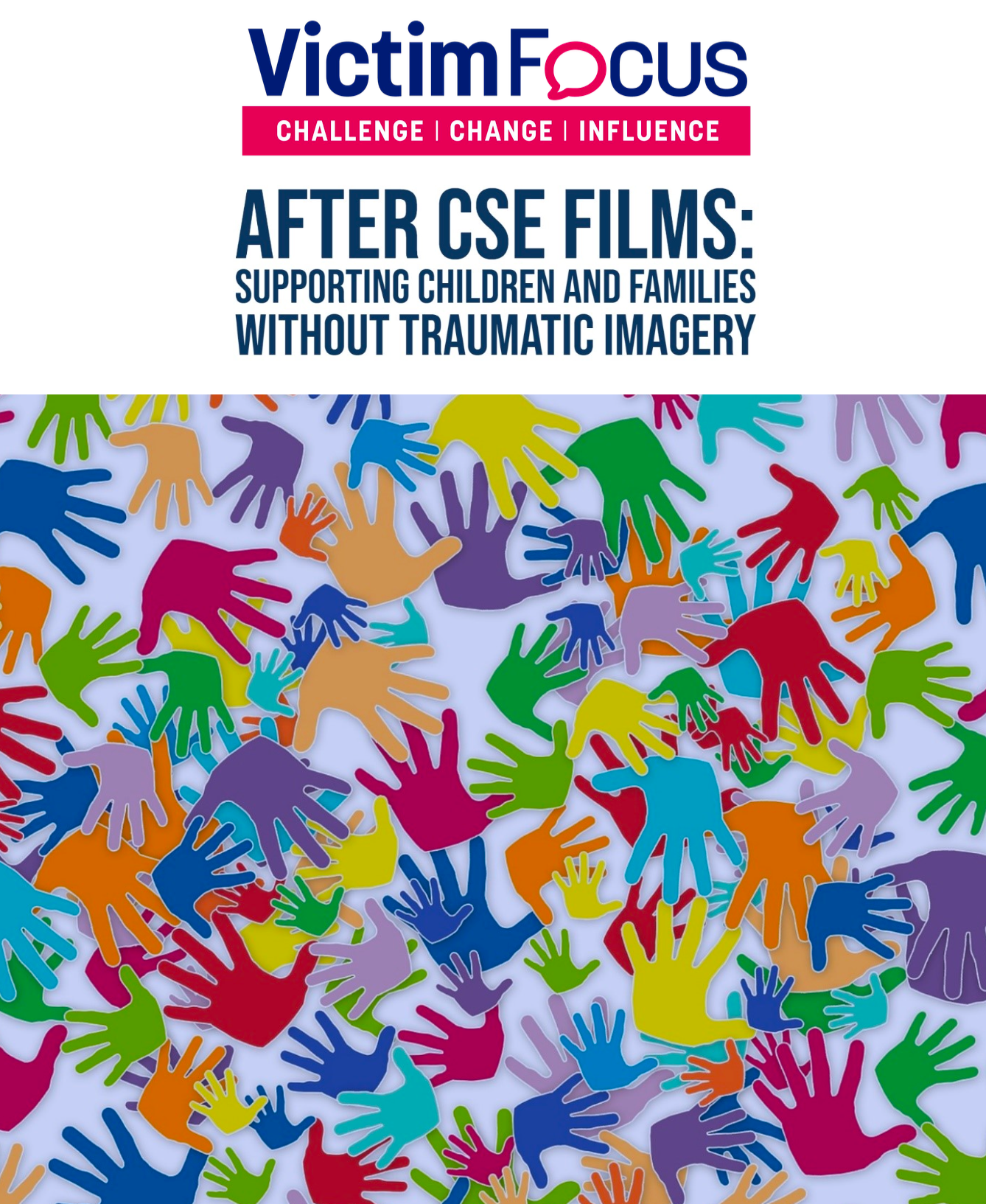
-
After CSE Films: Supporting children and families without traumatic imagery. Practitioner resource and guide
By Jessica Eaton
March 2019
This guide is a free and accessible collection of ideas and advice for practitioners working in child sexual exploitation (CSE) and abuse.
In November 2018, national organisations, local authorities, charities and police forces began to withdraw CSE films from practice. Many practitioners reported that they had never practiced without the films and didn’t know how else to support children subjected to sexual violence without them.
In the months following the withdrawal of films, many practitioners wrote to VictimFocus to ask for advice and guidance about alternatives to CSE films.
This guide for practitioners therefore provides valid alternatives to the use of CSE films in practice; both in one-to-one work and in school work with large groups of children.
A special thank you to all VictimFocus peer reviewers of this publication including Mark Monaghan, Sue Whitmore and Jaci Quennell. Thank you for your time and feedback.
Click below to download the report
Dentists and dental professionals
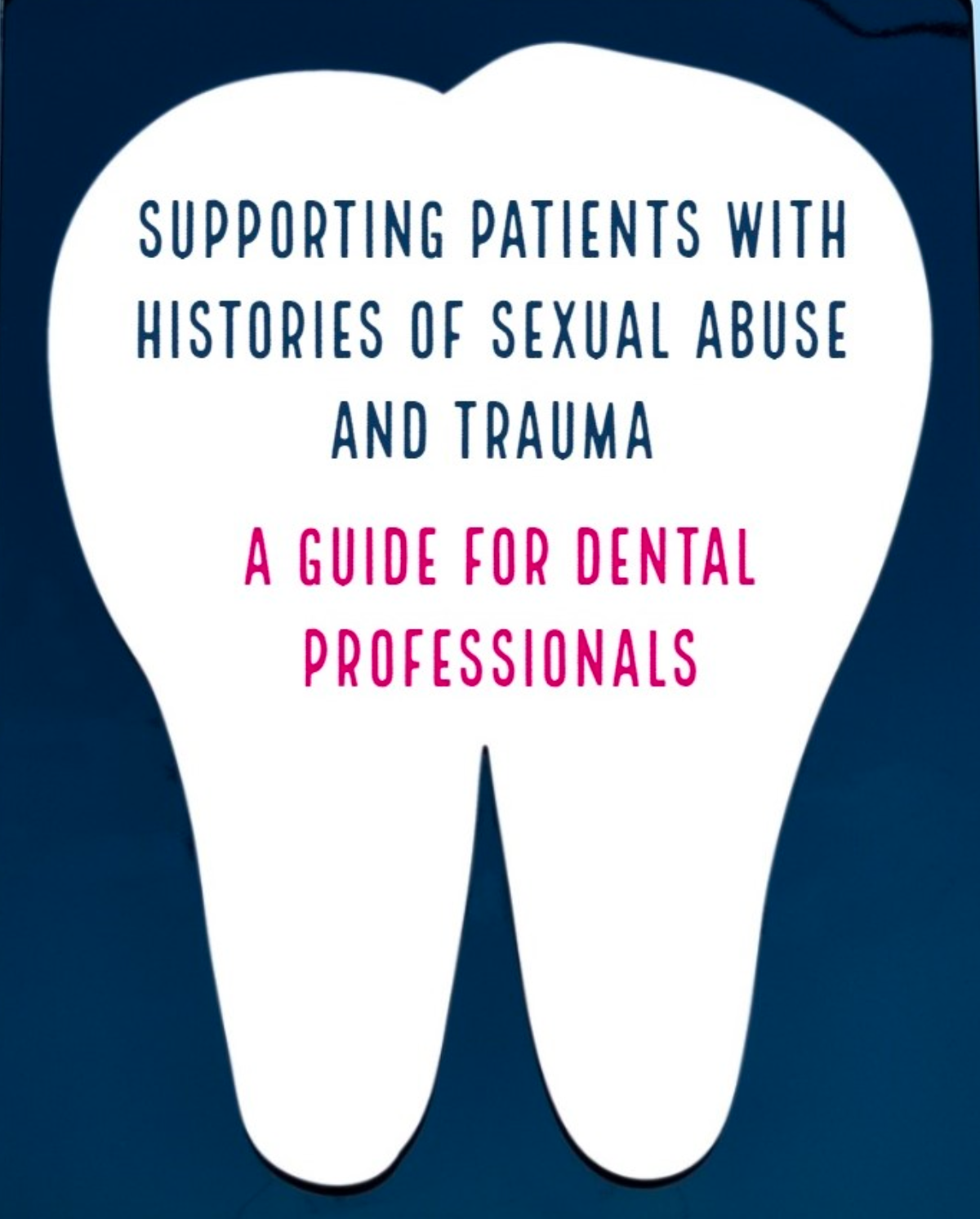
-
Supporting survivors and victims of abuse and trauma at the dentist
By VictimFocus
A free resource pack for dental professionals to implement trauma-informed practice and better support for victims and survivors of abuse and trauma when they visit the dentist.
The free resource pack includes:
- A PDF guide for dental professionals
- Two posters for dental practices
- A patient form to collect data on triggers, trauma responses and how to improve practice for your patients.
Click below to download the pack
